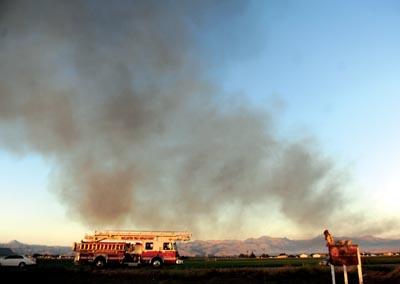
Police and fire overtime costs have escalated in recent years, eclipsing $800,000 in 2014 and $900,000 the year prior.
Those extra expenses—which weigh heavily on a general fund budget of $17.3 million—have come in the two departments that traditionally require the most overtime costs due to the unpredictable nature of the work.
In the police department, the 2014 overtime cost was $471,745. In the fire department, the number was $343,116, according to data provided by the finance office in response to a public records request from the Free Lance.
In fiscal year 2013-14, which ended last June, fire department overtime was $521,642 and police department overtime was $386,600.
Those inflated overtime costs partially led to 15 firefighters and 10 police personnel bringing home six-figure salaries in the calendar year 2014, according to the provided data. Those figures were down slightly from 2013, when 17 firefighters and 11 police employees made more than $100,000, according to the state controller’s website.
Generally rising annual overtime figures for Hollister’s police and fire departments have officials like Mayor Ignacio Velazquez concerned about their impact on the budget, which was fragile just three years ago before voters OK’d the Measure E tax extension.
Velazquez has vowed repeatedly to balance the budget without the need for an extension to the 1 percent Measure E sales tax, generating about $4 million annually. Cutting overtime costs could go a long way toward accomplishing that immense task, as Measure E sunsets in 2018.
“That’s why we’re pushing so hard to get that under control,” the mayor said. “This is that year where there is no more playing around with it.”
For 2014-15, city council members slashed the budgeted overtime amount for the fire department in particular. The fire overtime budget, projected at the start of the fiscal year, went from $440,000 in 2013-14 to $100,000 in 20014-15. Cutting back of overtime costs caused tensions within the department between firefighters and the former chief, who became the subject of a fire union-prompted investigation into claims, deemed unfounded, of nepotism and time card fraud.
The message from council members to now retired Fire Chief Mike O’Connor was clear: There was enough fire employees—39 sworn personnel and one support person—to prevent escalating overtime costs. The police department, meanwhile, is staffing 27 sworn officers and six support personnel.
Police Chief David Westrick responded to a query on overtime costs by noting how the department is currently understaffed by four positions, with a rash of medical issues causing it, and in the hiring process on those. He also mentioned how some grant funding is meant specifically for overtime costs.
So far this year, he said, the department is 3 percent below the budget projection for this period, but he expects to be slightly over at fiscal year’s end due to the shortage. He said savings in other areas could put the department below its overall yearly budget.
Numbers Analysis
2014 fire overtime: $343k
2014 police overtime: $472k
2013-14 fire overtime: $522k
2013-14 police overtime: $387k
Fire personnel: 40
Police personnel: 33
General fund budget: $17.3m
Total police pay 2014: $6.175m
Total fire pay 2014: $3.411m
Top 3 OT earners 2014
Fire department
Marco Aguirre: $36,975
Sean Olguin: $24,856
Timothy Schneider: $22,736
Police department
Eric Olson: $39,617
Juan Guevara: $30,143
Luis Toribio: $29,016
See more detailed information on overtime costs at left.









